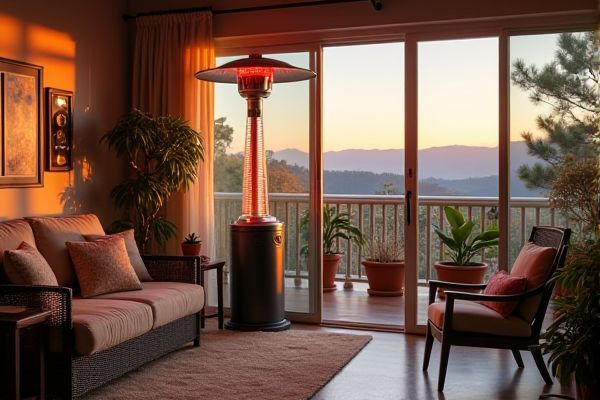
Balcony heaters are designed for smaller, enclosed spaces with a focus on safety and compactness, while patio heaters provide powerful heat output suitable for larger, open outdoor areas. Discover which heater best suits your outdoor space and lifestyle needs by reading the rest of the article.
Table of Comparison
| Feature | Balcony Heater | Patio Heater |
|---|---|---|
| Design | Compact, wall-mounted or portable | Freestanding, larger propane or electric units |
| Heat Output | Lower, ideal for small spaces | Higher, covers large outdoor areas |
| Fuel Type | Electric or infrared | Propane, natural gas, or electric |
| Installation | Easy, minimal setup | Requires placement on stable ground, possible gas line |
| Portability | Highly portable | Moderate, larger and heavier |
| Ideal Use | Balconies, small patios | Wide patios, outdoor dining areas |
| Cost Range | $50 - $300 | $150 - $800+ |
| Energy Efficiency | High for small spaces | Varies, less efficient in open spaces |
Introduction: Balcony Heater vs Patio Heater
Balcony heaters are designed for compact outdoor spaces, offering efficient heat output while being safe for use in apartment balconies with limited ventilation. Patio heaters generate higher heat suitable for larger open areas, providing widespread warmth through gas or electric power sources. When choosing your outdoor heating solution, consider the size of your space and installation restrictions to optimize comfort and safety.
Key Differences Between Balcony and Patio Heaters
Balcony heaters are specifically designed for compact, enclosed spaces and often feature safety measures like low surface temperatures and wall-mounting options suitable for limited airflow areas. Patio heaters, on the other hand, are larger, freestanding units intended for open outdoor areas, providing broader heat coverage with higher power output. Understanding these key differences ensures you select the right heater that fits your space size, ventilation needs, and safety requirements, enhancing Your outdoor comfort.
Types of Balcony Heaters
Balcony heaters come in various types, including electric wall-mounted, portable gas, and infrared models, each designed to efficiently warm small outdoor spaces. Electric balcony heaters offer safe, compact solutions with quiet operation, while gas-powered options provide powerful heat output ideal for chillier evenings. Choosing the right heater depends on your balcony's size, ventilation, and your preference for fuel type, ensuring optimal comfort for your outdoor experience.
Types of Patio Heaters
Patio heaters come in various types, including freestanding, tabletop, wall-mounted, and ceiling-mounted models, each offering distinct heating capacities and installation options. Freestanding patio heaters use propane or natural gas and provide wide heat coverage, making them ideal for larger outdoor spaces, while electric wall-mounted and ceiling-mounted heaters save floor space and deliver targeted warmth for smaller balconies or patios. You can choose a patio heater based on your space size, fuel preference, and portability needs to ensure optimal outdoor comfort.
Heating Efficiency and Coverage
Balcony heaters are designed for compact spaces, offering focused heating efficiency suitable for small outdoor areas, while patio heaters provide broader heat coverage, making them ideal for larger open spaces. Your choice depends on the size of your outdoor area and the desired warmth; balcony heaters often use infrared technology for targeted heat, whereas patio heaters typically emit ambient warmth to cover wider zones. Understanding the heating power measured in BTUs and the expected coverage area helps you select the best option for comfort and energy efficiency.
Installation and Placement Considerations
Balcony heaters typically feature compact designs and require wall-mounting or ceiling installation, making them ideal for limited spaces with secure attachment points, while patio heaters are freestanding units needing stable, flat surfaces for placement. Balcony heaters demand proper ventilation and electrical access for safe operation, whereas patio heaters often use propane or natural gas, requiring clearance from combustible materials and open-air settings to prevent gas buildup. Careful assessment of space dimensions, power sources, and safety regulations is crucial when selecting between balcony and patio heaters for optimal installation and placement.
Safety Features and Concerns
Balcony heaters often include automatic shut-off mechanisms and cool-to-touch surfaces to ensure safety in confined spaces, while patio heaters feature sturdy bases and tip-over protection designed for open outdoor use. Both types incorporate flame failure devices and weather-resistant materials to minimize fire hazards and withstand environmental exposure. Proper placement and adherence to manufacturer guidelines remain critical to prevent accidents and ensure optimal safety for users.
Energy Consumption and Cost Comparison
Balcony heaters typically consume less energy than patio heaters due to their smaller size and lower heat output, making them more cost-effective for confined outdoor spaces. Patio heaters, often powered by propane or natural gas, generally have higher energy consumption but can heat larger areas more rapidly, resulting in higher operational costs. Your choice should balance initial investment and ongoing energy expenses based on the size of your outdoor area and heating requirements.
Best Uses: Which Spaces Suit Each Heater?
Balcony heaters are ideal for compact, enclosed spaces where targeted warmth is needed, such as small balconies or enclosed porches, offering efficient heat distribution without overwhelming the area. Patio heaters are better suited for larger, open outdoor spaces like patios and gardens, providing broad, radiant heat that covers multiple people comfortably. Your choice depends on the size and openness of the area, with balcony heaters perfect for intimate settings and patio heaters excelling in spacious outdoor environments.
Final Verdict: Choosing Between Balcony and Patio Heaters
Balcony heaters are designed for compact outdoor spaces, offering efficient heat output and easy installation, making them ideal for apartment balconies or small terraces. Patio heaters provide a broader heating range suited for larger open areas, often featuring higher heat capacity and durability to withstand various weather conditions. Your choice depends on the size of your outdoor space and heating requirements, with balcony heaters best for confined areas and patio heaters perfect for expansive patios or garden zones.
 homyna.com
homyna.com